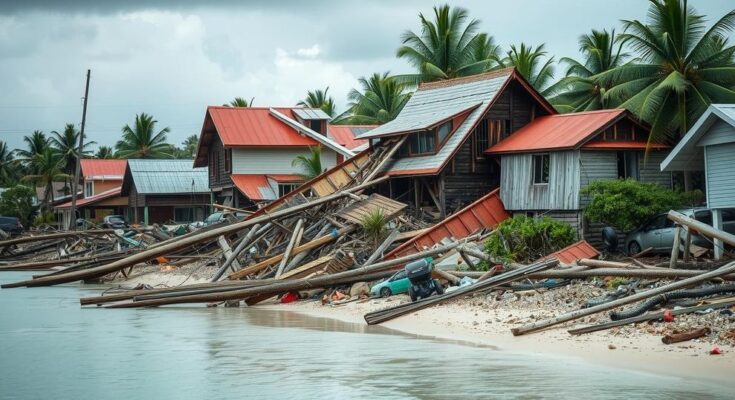Cyclone Chido has devastated Mayotte, leading to estimates of hundreds of fatalities and significant infrastructure damage. The storm has caused acute shortages of water, food, and power, leaving many residents in dire conditions. Efforts to rescue survivors and provide aid are complicated by the region’s socioeconomic challenges and the presence of a large undocumented population. The cyclone has also affected Mozambique, raising concerns about humanitarian crises in both regions.
Residents of Mayotte are grappling with catastrophic consequences following Cyclone Chido, which has been described as the worst storm to strike the French Indian Ocean territory in nearly a century. With wind speeds exceeding 225 km/h (140 mph), extensive damage has been reported, particularly in impoverished areas populated by those living in precarious sheet-metal homes. Local authorities confirm that while twenty fatalities have been recorded, estimates suggest that the number may unfortunately rise into the thousands due to the overwhelming destruction and the large undocumented migrant population within the territory’s 320,000 residents.
The cyclone has severely disrupted infrastructure, with downed power lines and impassable roads complicating rescue and recovery efforts. Amidst this chaos, approximately 85% of the region remains without power, and many residents have resorted to relying on polluted and unusable water sources. A midwife working at the central hospital characterized the situation as dire, stating, “The water here is completely yellow. It’s unusable for us.” With essential supplies scarce, ongoing reports indicate severe shortages of food, water, and adequate shelter.
Humanitarian response teams are mobilizing, including reinforcements from France, to locate survivors and deliver aid. The local prefect has warned that the death toll could rise substantially as rescue operations unfold; however, establishing a precise count is challenging given the high number of undocumented migrants, which complicates understanding the full scale of the disaster. Officials have noted that certain cultural practices regarding burial complicate efforts to document fatalities.
As Mayotte struggles under these dire conditions, Cyclone Chido has also left its mark on Mozambique, causing flash floods, destruction to infrastructure, and displacing numerous individuals. Authorities have expressed deep concern over potential public health crises stemming from the loss of access to clean water and medical services in both areas affected by Chido. The intensity of Cyclone Chido, linked to factors such as climate change, has raised alarms regarding future extreme weather events, demanding urgent international attention and aid, particularly for the island’s most vulnerable populations.
Cyclone Chido has become a pivotal natural disaster for Mayotte, highlighting the region’s vulnerabilities. Mayotte, a French territory since 1841, has struggled with high poverty rates and political instability. A significant portion of its population lives below the poverty line, and a notable undocumented migrant community exists, complicating post-disaster assessments. The infrastructure is often inadequate, which has intensified the impact of Cyclone Chido, categorically the worst storm in nearly a century. The cyclone’s effects extended beyond Mayotte, impacting Mozambique and raising climate-related concerns globally.
The aftermath of Cyclone Chido in Mayotte reveals a catastrophic situation exacerbated by existing vulnerabilities. With the potential for the death toll to rise into the thousands and dire shortages of essential resources, the region’s response mechanisms are severely tested. The international humanitarian community remains alert as the ongoing crisis underscores the need for proactive measures against climate change and disaster preparedness, particularly in impoverished regions vulnerable to extreme weather events.
Original Source: www.bbc.com




